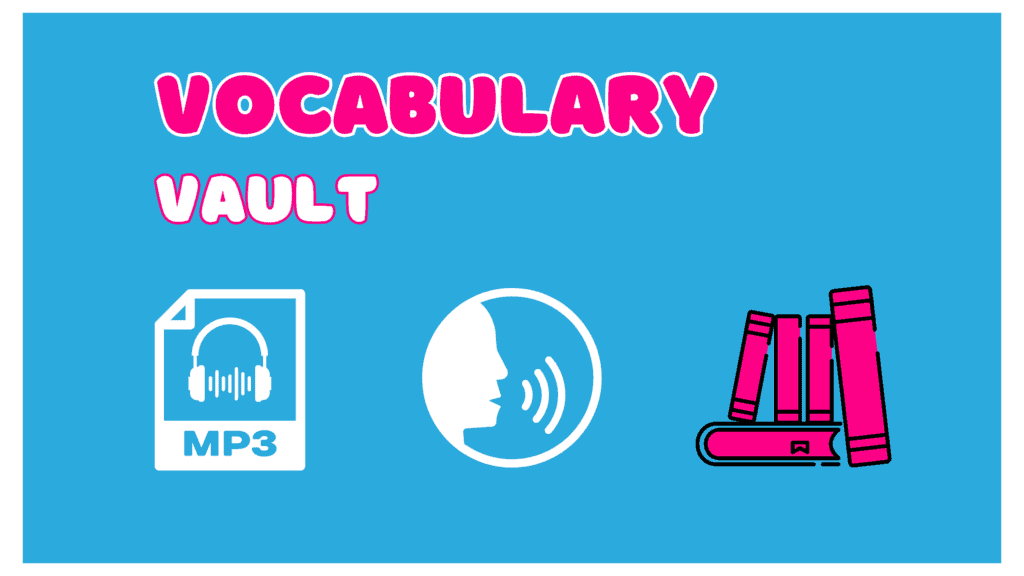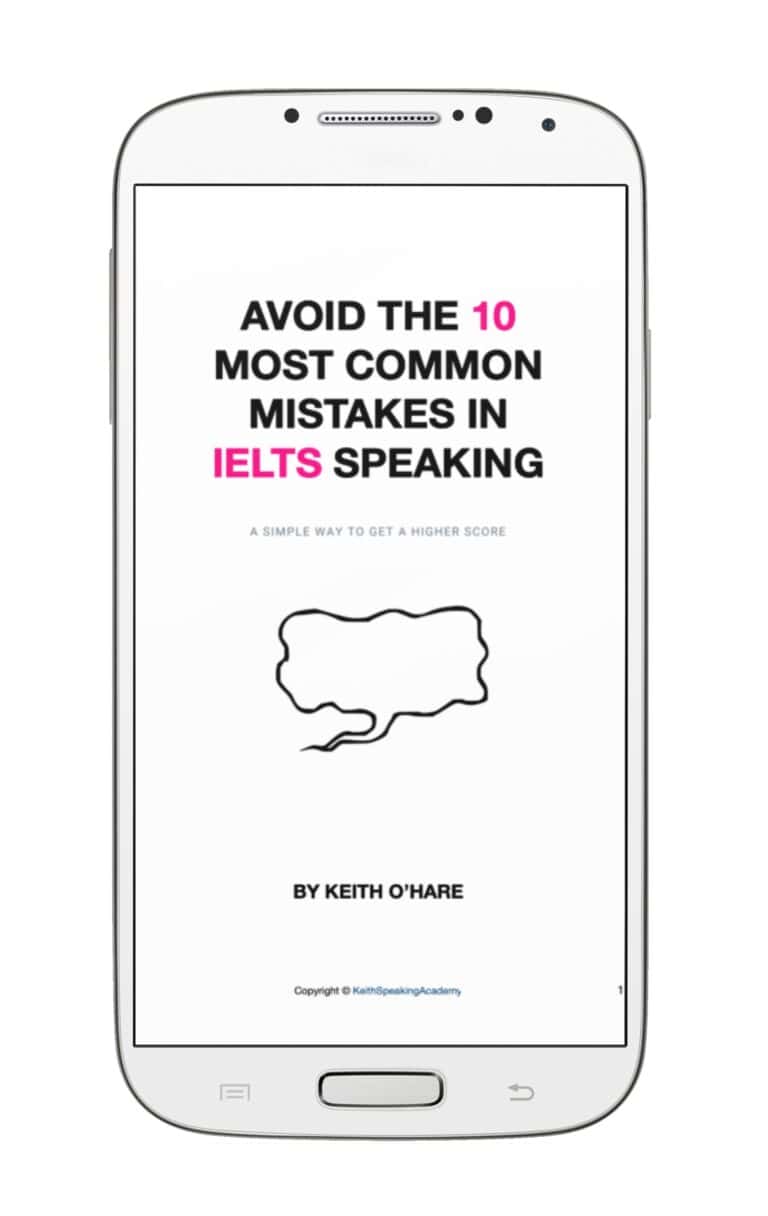IELTS Speaking Lesson about Weather
👇 Take this lesson with you! 👇
Topics such as WEATHER can come up in several areas in IELTS Speaking. This may include questions about the main kinds of weather, the effect of climate change, and so on.
In this lesson, you will learn the vocabulary needed to talk confidently on this topic.
Table of Contents
IELTS Speaking vocabulary: Weather
Let’s look first at some adjectives, verbs and nouns we can use to talk about the weather.
- Using ADJECTIVES to describe the Weather
It’s hot in my city
It’s rainy today
It’s ____ in my city
It’s ____ today
Remember, in IELTS Speaking you need to use a wide range of vocabulary, so as you practice, always try to build up new words, synonyms (similar meaning) and antonyms (opposite meaning).
Ways of saying VERY HOT:
- scorching
- sweltering
- boiling
- baking
It’s sweltering today
Different ways of saying COLD:
The following are from the coldest at the top, to the least cold at the bottom.
- Freezing / freezing cold
- Bitterly cold
- Cold
- Nippy
- Quite chilly
- Cool
Different ways of saying WET:
- it’s humid
- it’s muggy
- it’s damp
I’m soaking wet because I was walking in the rain
Different ways fo saying NOT VERY BRIGHT (no sunshine):
- cloudy
- overcast (cloudy)
- dull (dark and cloudy)
- bleak (not bright and it is cold)
- gloomy (not bright and it is cold)
- dismal (not nice, cold, gloomy)
- foggy
- misty
- muggy
Notice: Bright (adj.) can also mean intelligent, and dull (adj.) can also mean unintelligent.
- Using NOUNS to describe the Weather
We got a lot of rain in my city
We frequently have showers in my city
We get a lot of ________
We frequently have _______
Nouns connected to the sun
- sunshine
- sunny spells (short periods of sunshine)
- heat waves (long periods of intense heat)
Nouns connected to the rain
- tropical storms
- showers
- downpours
- heavy rain
- torrential rain
- typhoons
- droughts (no rain for long periods)
Nouns connected to the snow
- snow
- sleet (snow + rain)
- snow storms
- blizzards (snow storm)
Nouns connected to the wind
- wind
- storms
- hurricanes
- typhoons

- Using VERBS to describe the Weather
We can use either the present simple or the present continuous here. The meaning is almost the same, just the feeling is a little stronger and more vivid when we use the present continuous, almost like you are complaining.
- Present Simple
It always rains where I live
It always / often / usually ______ where I live
- rains
- pours
- pours down
- drizzles (=light rain),
- snows
- sleets
- hails (balls of hard snow)
- Present Continuous
It is always raining where I live
It is always ______ where I live
- raining
- pouring
- pouring down
- drizzling (=light rain),
- snowing
- sleeting
- hailing (balls of hard snow)
Here are other ways of using verbs to talk about the weather.
It tends to rain a lot where I live
It tends to____(verb)____ where I live
- rain a lot
- pour down
- snow
IELTS Speaking vocabulary: Changes in the weather
There are probably 5 main kinds of weather.
- Hot
- Mild (in between hot and cold)
- Cold
- Wet
- Dry
The weather changes due to a number of different factors, including the following
- Different seasons
- Different location
- Changes in air pressure and wind
- Pollution
- Climate change
Find out more about weather changes below:
https://www.dkfindout.com/us/earth/weather/what-causes-weather/

What is the weather like in your country?
It depends on _____, if we are talking about _____, then ______
It depends on the season, if we are talking about summer, then it tends to be scorching most of the time.
It depends on the location, if we are talking about the north, then we have a lot of rain.
If you want to talk about Climate Change, you can find lots of useful information here
https://keithspeakingacademy.com/how-to-talk-about-climate-change-in-ielts-speaking/
IELTS Speaking conversations and tips
In this interview, I speak to Fiona Wattam, (aka Fiona with IELTS).
She is Welsh and lives in England working in a university as a teacher and learning technologist.
She also runs an online membership academy to support students preparing for the IELTS test.
In this interview, she talks about her passions, outside of work, and gives some tips for students of English and IELTS.
First, here is some vocabulary that will help you understand the interview.
Useful vocabulary
- Parallels (n.) =similarities
There is a parallel between ___A__ and ____B___
- To have something in mind = to be thinking about something
- To be consistent = to do something everyday / regularly
Notice the pronunciation of this phrase in the interview
As soon as I / suːnəzaɪ /
Linking makes it into a memorable chunk.
- To plod along (inf.) = to continue slowly and boringly
I am plodding along with my studies
My new project at work is plodding along
- To be spoon-fed = to give so much information or help that a person doesn’t need to think (negative). Similar to ‘to be spoilt’.
We shouldn’t spoon-feed students, let them do more things on their own.
Watch, listen and answer the following:
Remember press CC in the video navigation for subtitles
- Where does she live?
- What are her 2 passions?
- What are her tips for learning English?
Interview Answers:
Click arrow to open/close answers
1) Where does she live?
- Colchester in the UK
2) What are her 2 passions?
- Technology and running
- Learning technologists
3) What are her tips for learning English?
- Be consistent
- Read more the booklist
- Do more than the bare minimum
- Stop learning IELTS as a subject
- Compare with others (in a community) to get motivation
- Lots of repetition
IELTS Speaking idioms about weather
- Come rain or shine = whatever happens
Every Friday, we watch a family film, come rain or shine.
- To pour down = to rain a lot
It’s been pouring down for hours, I wish it would stop
- To pick up = to get better
The weather has been dismal lately, but it’s picking up at last
Notice:
To pick up something = to learn informally
Something picks up = get better
- Out of the blue = totally unexpected
Yesterday, out of the blue, we had a typhoon
- To be snowed under = to have a lot of work
I can’t go to the bar with you, I am snowed under at work.
Pronunciation Files For Vocabulary From My Best Live Lessons
Use Words EASILY in English Conversations!
More Free Lessons
If you liked this lesson, leave a comment below!
There are more lessons you can follow in the links below too.
TRAVEL in IELTS Speaking. Vocabulary and idioms you need to describe your travel plans and experience.
ENVIRONMENT in IELTS Speaking. Learn different ways to protect our environment and discuss it with idioms and vocabulary in this lesson.
CLIMATE in IELTS Speaking. Learn the essential vocabulary for this topic, as well as how to talk about the causes of and solutions to Climate Change.



It was fantabulous! Thanks a million.
Glad you liked it!